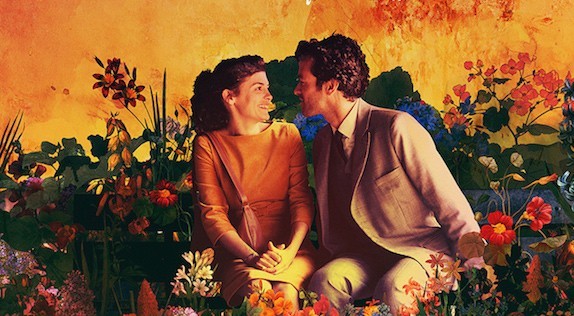“Mood Indigo” is so aggressively French — not just French, but avant garde, let’s-blow- Gauloise-smoke-up-our-asses French — that I’m not sure that citizens of any other country should subject themselves to it.
The latest from the ever-eccentric Michel Gondry (“Eternal Sunshine of the Spotless Mind”) starts out like an episode of “PeeWee’s Playhouse” and ends up like one of Ingmar Bergman’s uber-dark meditations on mortality.
The first half — the “fun” half — unfolds in the Paris world of Colin (Romain Duris), a child/man who lives in what appears to be a subway car slung between two tall buildings. Colin is a Duke Ellington-obsessed inventor (thus the film’s title). Among his Rube Goldberg-ish creations is an upright piano which mixes cocktails, the ingredients and proportions determined by which jazz classic is being played.
Colin’s household is a wonder. Live eels squirm out of the kitchen tap, his meals (thanks to stop-action animation) come to life on the table, and a mouse (an actor in an animal suit) grows fresh veggies in a greenhouse fashioned from an old microwave oven.
Colin has a astoundingly skilled chef and manservant (Omar Sy of “The Intouchables”); his best friend Chick (Gad Elmaleh) is obsessed with the philosophy of an existential philosopher Jan-Sol Patre (clearly based on Jean-Claude Sartre).
At a party Colin meets Chloe and it’s love at first sight. Not just because Chloe is played by Audrey (“Amelie”) Tautou, but because “Chloe” is the title of a memorable Ellington composition.
Kismet, right?
Their courtship is magical, thanks to a sort of aerial swan boat that allows them to drift languidly over Paris. They marry. All is wonderful.
And then Chloe gets sick. A doctor informs the couple that she has a water lily growing in her lung. (Yes, you read that correctly.)
Sudden the playful Colin must get a job, pay medical bills, help his beloved through her long decline.
The film’s colorful palette fades to shades of gray. It’s a time of winter, not only physically but in Colin’s sorry soul. (Not to mention the audiences’ sorry souls — has a film ever gone from playful to grim so completely?)
The problem here is one of tone. Gondry sets such a lighthearted, fantastic mood early on that the film’s second half feels like emotional betrayal.
But even in the first half his studied “cuteness” soon wears out its welcome. It’s as if Gondry devotes 45 minutes to telling us not to take any of this too seriously, then expects us to shift to mourning mode for the dour denouement.
Go for the intriguing visuals. But don’t be surprised if you want it to end after the first hour.









